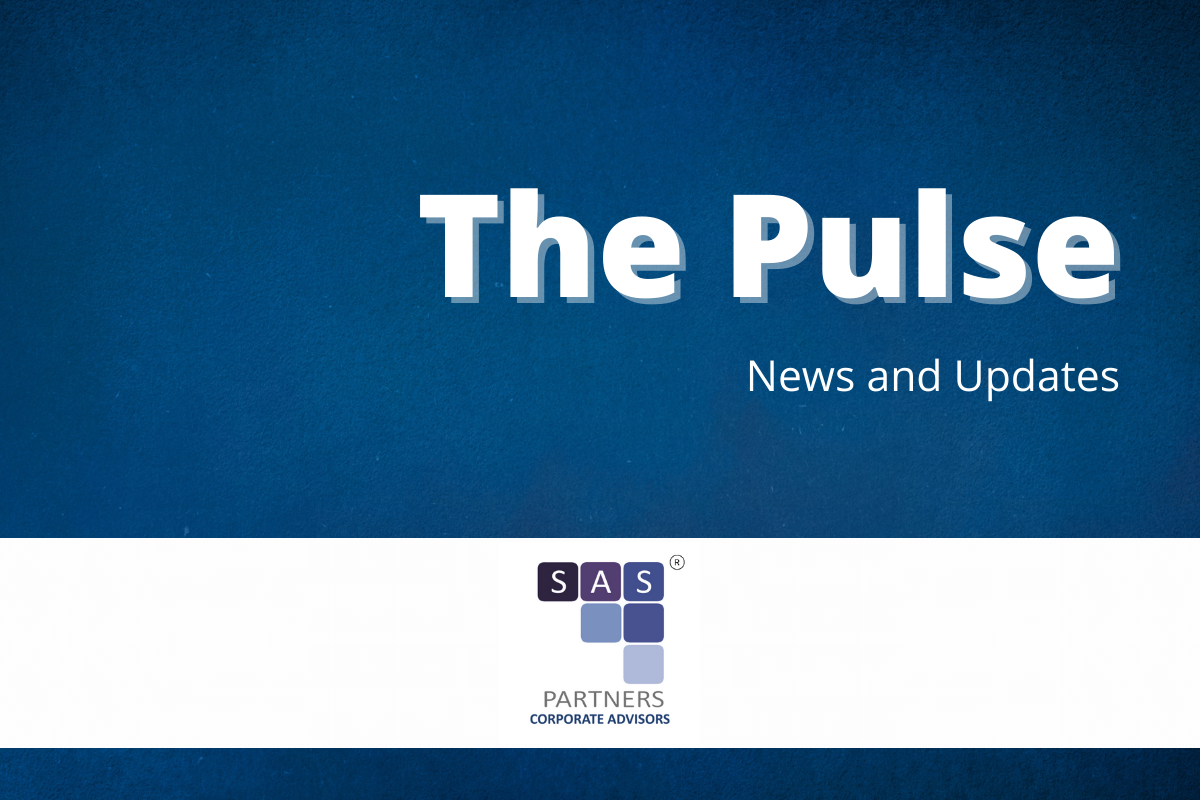
Regulatory Updates – MCA Updates
Relaxation in paying additional fees in case of delay in filing DPT-3 for the Financial Year ended on 31st March 2023 regulatory updates
The due date for filing of Form DPT-3 (Return of Deposits) is 30th June 2023 for the financial year ending on 31st March 2023. Due to the transition of the MCA-21 portal from Version 2 to Version 3, the Ministry of Corporate Affairs (MCA) has, vide its circular dated 21st June 2023 relaxed the payment of additional fees upto 31st July 2023 in case of delay in filing of Form DPT-3.
Click here to access the Circular.
Non – Applicability of Moratorium period under Insolvency and Bankruptcy Code, 2016
The MCA has issued a notification in relation to Section 14 of the Insolvency and Bankruptcy Code, 2016 regarding the non-applicability of the Moratorium period, where the corporate debtor has entered into any of the transactions, agreements or arrangements with respect to the Production Sharing Contracts, Revenue Sharing Contracts, Exploration Licenses and Mining Leases made under the Oilfields (Regulation and Development) Act, 1948 including Joint Operating Agreement.
Click here to access the Notification.
SEBI Updates
Online Processing of Investor service requests and complaints by RTAs regualtory updates
SEBI vide its Circular dated June 08, 2023, proposed to digitize the process to submit various documents to RTAs by the holders of the physical security certificates. It is proposed to provide a mechanism for investors to lodge service requests and complaints online and thereafter track the status and obtain periodical updates.
In Phase 1, all RTA servicing listed companies shall have a functional website & shall contain the prescribed information.
In Phase 2, a common website shall be made and operated by Qualified Registrars to Issue and Share Transfer Agents (QRTA) from June 01, 2024, through which investors shall be redirected to individual web-based portals/websites of the concerned RTA for further resolution by putting the name of the listed company.
The detailed circulars with further details of the execution of the two phases can be accessed at the below-mentioned link.
Click here to access the Circular
Master Circulars on (I) Scheme of Arrangement by Listed entities and (II) Relaxation under Sub-rule (7) of Rule 19 of the Securities Contracts (Regulation) Rules, 1957 regulatory updates
SEBI issued Master Circular dated June 20, 2023 on scheme of arrangement for incorporating various circulars/directions issued periodically by SEBI with respect to the compliance to be followed by listed companies while undertaking the scheme of arrangement.
The intent of this Master Circular is to consolidate all such previously issued circulars and directions issued by SEBI into one comprehensive circular for the ease of reference of the stakeholders. Apart from the consolidation of previous circulars, there were also few key changes introduced under regulations.
With the issuance of this Master Circular, all the previous circulars/ directions issued by SEBI as listed in Schedule I of this Master Circular in this regard will stand rescinded.
The Consolidated Master Circular, along with the key enhancements can be accessed by clicking on the link below:
Click here to access the Master Circular
Master Circular for Issue of Capital and Disclosure Requirements regulatory updates
All circulars/ directions issued under the Securities and Exchange Board of India (Issue of Capital and Disclosure Requirements) Regulations, 2018 (“ICDR Regulations 2018”) are hereby replaced with the master circular issued by SEBI on 21st June 2023 in order to enable the stakeholders to have access to all such circulars at one place.
The relevant previous circulars as listed in the appendix to this master circular shall stand rescinded.
The Consolidated Master Circular disclosing guidelines, framework, and such other annexures as may be required can be accessed by clicking on the link below:
Click here to access the Master Circular
Master Circular for Listing Obligations and Disclosure Requirements for Non – Convertible Securities, Securitised Instruments and/ or Commercial Paper
The purpose of this circular issued by the Securities and Exchange Board of India (SEBI) on 30th June 2023 is to ensure effective regulation of the Bond market and to provide issuers and other market stakeholders with access to all relevant circulars pertaining to listing obligations and disclosure requirements covering the operational and procedural aspects for issuers of Non-Convertible Securities, Securitized Debt Instruments and/or Commercial Paper at one place.
The Circular is a compilation of the relevant existing circulars, with consequent changes detailing it chapter-wise along with footnotes, providing directions to Recognized Stock Exchanges, Issuers and other stakeholders, etc. which shall only come into force on August 01, 2022, unless otherwise mentioned in the Circular.
Click here to access the Master Circular
SEBI (Listing Obligations and Disclosure Requirements) (Second Amendment) Regulations, 2023
The Securities and Exchange Board of India (SEBI) vide its Notification dated 14th June 2023 has issued the SEBI (Listing Obligations and Disclosure Requirements) (Second Amendment) Regulations, 2023 (LODR Regulation) by introducing several amendments with the objective of removing ambiguity on timelines of disclosures, enhancing the transparency, protection to minority shareholders, enhanced Corporate Governance etc.
The change will take effect from the thirtieth day (i.e., July 14, 2023) from the date of publication. The major change involves:
- Stricter timeline to fill any vacancy of the office of the Compliance Officer, Director and Key Managerial Personnel (KMP) position within 3 months of the vacancy date.
- Directors cannot have permanent membership on the board of a listed company. The continuance of all the Directors on the Board shall be subject to the approval of Shareholders in a General Meeting at least once in every five years from the date of appointment or re-appointment.
- Introduction of threshold-based criteria for determining the materiality of events/information(s) and specified different and clear timelines for disclosure of the events/information(s) depending on the nature and origin.
- Mandatory disclosure of details regarding cyber security events, breaches, or data loss, along with the quarterly compliance report.
- The top 100 listed entities (effective from October 1, 2023) and then the top 250 listed entities (effective from April 1, 2024) must validate the market rumours in the “mainstream media” and offer clarification within 24 hours of the event or information being reported.
- Revision of timelines for informing various events/ information(s) to the stock exchanges.
- Publication of material events/ information(s) on the website at least two days before the meeting of Institutional Investors.
- Shareholder approval is necessary if an undertaking is sold, leased, or disposed of outside of the Scheme of Arrangement.
- Requirements for disclosure of certain types of agreements with shareholders, promoters, promoter group entities, related parties, directors, key managerial personnel and employees of a listed entity or of its holding, subsidiary and associate company binding with listed companies.
- Extension of one more year (i.e., till March 31, 2024) on the applicability of Chapter IV to a ‘high-value debt listed entity’ on a ‘comply or explain’ basis.
The detailed amendments to LODR regulations can be accessed by clicking the following link:
Click here to access the Notification
Income Tax Updates
CBDT notifies the Pension Fund named 2743298 Ontario Limited as the specified person
The Central Government, in accordance with the powers granted by the Income Tax Act, 1961, specifies a pension fund named 2743298 Ontario Limited (PAN: AACCZ0130B) as the specified person for the purpose of a particular clause (23FE) of section 10 of the Act. This specification is valid for eligible investments made by the pension fund in India from the date of publication of the notification until March 31, 2024. However, certain conditions must be fulfilled by the pension fund.
Click here to access the notification
CBDT simplifies the process for Advance Ruling Applications regulatory updates
The Central Board of Direct Taxes (CBDT) has recently made a significant amendment to Rule 44E of the Income Tax Rules, 1962, aimed at simplifying the process for applicants seeking advance rulings. Through Notification 37/2023 dated 12 June 2023, the CBDT has eliminated the mandatory digital signing requirement for Advance Ruling applications, bringing relief to taxpayers and reducing the burden on the Authority for Advance Rulings (AAR).
Click here to access the notification
e-Advance Rulings Scheme, 2023
The Central Board of Direct Taxes (CBDT) has taken a significant step towards enhancing the efficiency and effectiveness of the e-advance rulings (eAR) scheme with the introduction of the e-advance rulings (Amendment) Scheme, 2023. This scheme aims to provide written opinions or authoritative decisions on the tax consequences of a transaction or proposed transaction, as well as assessments related to them.
According to this amendment, in situations where Board Members hold differing opinions, the matter will be referred to the Principal Chief Commissioner of Income Tax (International Taxation). The Principal Chief Commissioner will then nominate a member from another Board for Advance Rulings to decide the advance ruling. This ensures that a fair and unbiased decision is made in cases where there is a lack of unanimity among the Board Members.
Click here to access the notification
Cost Inflation Index (CII) for the Financial Year 2023-24 regulatory updates
CBDT notifies the CII data for each financial year. In this process, the Cost Inflation Index or CII for the Financial Year 2023-24 is notified as 348. The same was at 331 in the last year 2022-23, an increase of 5.14% over the preceding financial year. The CII is used for calculating ‘Long Term Capital Gains (LTCG)’ under Income Tax. CBDT announces fresh CII each year using the base year 2001-02 as equal to 100. regulatory updates
Click here to access the notification
CBDT Amends IT Rules 2BB, 3, 5 and Inserts New IT Rule 21AGA regulatory updates
The Central Board of Direct Taxes (CBDT) has recently issued Notification 43/2023, introducing crucial amendments to the Income Tax Rules, 1962. These amendments aim to provide clarity and guidelines pertaining to the taxation provisions outlined in section 115BAC of the Income Tax Act, 1961. The changes brought about by this notification have a significant impact on various aspects of taxation, including employee exemptions, depreciation allowances and the option exercise & withdrawal process.
1. Amendments to Rule 2BB: Employee Exemptions:
The CBDT has amended Rule 2BB, which pertains to exemptions for employees. The new sub-rule (3) states that employees who have exercised an option under section 115BAC(5) or whose income is chargeable under section 115BAC(1A) will be entitled to exemption only for specific allowances.
2. Amendments to Rule 3: Free Food and Non-Alcoholic Beverages
Rule 3 has also been amended in the CBDT notification. The revised sub-rule (7) clarifies that the provisions related to free food and non-alcoholic beverages provided by the employer through paid vouchers do not apply to employees who have exercised an option under section 115BAC(5) or whose income is chargeable under section 115BAC(1A).
3. Amendments to Rule 5: Depreciation Allowance
Rule 5 has undergone significant amendments concerning depreciation allowance. The first proviso is substituted to state that the allowance for the depreciation of any block of assets cannot exceed 40% of the written-down value of the block of assets. This limitation applies to specific entities such as domestic companies, individuals, Hindu undivided families, associations of persons and co-operative societies, based on their options exercised under different sections of the Income Tax Act, 1961.
Additionally, the third proviso in Rule 5 is replaced to reflect the change made by the Finance Act, of 2023. A new proviso is inserted after the third proviso, which specifies that if income is chargeable under section 115BAC(1A), the written-down value of the block of assets as of April 1, 2023, should be increased by the depreciation attributable to clause (ii a) of sub-section (1) of section 32. This depreciation should not have been fully set off under sub-clause (a) of clause (ii) of sub-section (2) of section 115BAC.
This provision applies if two conditions are met:
i) the assessee has not exercised the option under section 115BAC(5) for any previous year relevant to the assessment year beginning on or before April 1, 2023, and
ii) there is a depreciation allowance pending for a block of assets that arises from clause (ii a) of sub-section (1) of section 32.
4. Introduction of Rule 21AGA: Option Exercise and Withdrawal
The CBDT notification introduces a new rule, 21AGA, which specifies the procedure for exercising the option under section 115BAC(6) of the Income Tax Act, 1961. Individuals, Hindu undivided families, associations of persons and artificial juridical persons can exercise this option. The option must be submitted using Form 10-IEA on or before the due date for filing the income tax return. The same form is also used for withdrawing the option. Form 10-IEA should be furnished electronically under a digital signature or electronic verification code.
Click here to access the notification
CBDT Notifies Price Variation Tolerance Limits for ALP Determination (Transfer Pricing u/s 92C) for AY 2023-24 regulatory updates
The Central Board of Direct Taxes (CBDT) has notified the tolerance limits for price variation in Arm’s Length Price (ALP) determination for transfer pricing under Section 92C of the Income Tax Act, 1961. The notification is for Assessment Year (AY) 2023-24 and applies to both international and specified domestic transactions. The CBDT has stated that if the variation does not exceed 1% of the wholesale price and 3% in all other cases, then the actual transaction price shall be taken as the ALP. These limits are similar to those notified for AY 2021-22 and 2022-23.
Click here to access the notification
Order U/s 119 of the Income Tax Act 1961 for extension of time limits for submission of certain TDS/TCS Statements regulatory updates
The CBDT has extended the due date for filing TDS/TCS statements in Forms 26Q, 27Q and 27EQ for the first quarter of the financial year 2023-24. Originally scheduled to be filed by July 15 or July 31, 2023, taxpayers now have until September 30, 2023, to submit these statements. This extension specifically applies to the statement of deduction of tax (Form 26Q or 27Q) and the statement of collection of tax (Form 27EQ) for the first quarter of FY 2023-24, which covers the period of April to June 2023.
Click here to access the notification
CBDT’s Clarifications on TCS for LRS & Overseas Tours regulatory updates r egulatory updates
The Central Board of Direct Taxes (CBDT) recently issued Circular 10/2023 on June 30th, 2023, providing valuable clarifications and FAQs regarding the implementation of changes related to Tax Collection at Source (TCS) on the Liberalised Remittance Scheme (LRS) and the purchase of overseas tour program packages.
1. No TCS on Expenditure through International Credit Cards
One of the significant clarifications is related to the use of international credit cards while overseas. As per the circular, the classification of such transactions under LRS is postponed until further notice. Consequently, no TCS shall be applicable on expenditures made through international credit cards while overseas until a subsequent order is issued.
2. Combined Threshold of Rs 7 Lakhs Applicable for TCS on LRS
The TCS rates will depend on the time of remittance, as the rates change from October 1st, 2023. Here is a breakdown of the applicable TCS rates:
i) The first Rs 7 lakh remittance under LRS during the financial year 2023-24 for education purposes (or any purpose) – No TCS applicable.
ii) Remittances beyond Rs 7 lakh under LRS during the financial year 2023-24, if made on or before September 30th, 2023 – TCS at 5% (unless it is for education purpose financed by a loan from a financial institution, in which case the rate is 0.5%).
iii) Remittances beyond Rs 7 lakh under LRS during the financial year 2023-24, if made on or after October 1st, 2023 – TCS at 0.5% (for education purposes financed by a loan from a financial institution), 5% (for education or medical treatment), and 20% (for other purposes).
3. Rs 7 Lakh Threshold for Remitter and not for Authorized Dealer
The threshold of Rs 7 lakh for Tax Collected at Source (TCS) under the Liberalized Remittance Scheme (LRS) applies to the remitter and not to the authorized dealer. This means that if the amount or aggregate of amounts being remitted by a buyer is less than Rs 7 lakh in a financial year, TCS is not required.
4. Rs 7 Lakh Threshold per Financial Year
The circular clarifies that the threshold of Rs 7 lakh applies for the entire financial year and is not separate for each six-month period. Therefore, if the threshold of Rs 7 lakh is crossed at any point during the financial year, TCS will be applicable on the remittance amount exceeding Rs 7 lakh.
5. Independent Thresholds for TCS on LRS and Overseas Tour Packages
The circular clarifies that the threshold of Rs 7 lakh for TCS under LRS and the threshold of Rs 7 lakh for the purchase of overseas tour program packages are independent of each other. These thresholds should not be confused or combined. Each threshold applies separately based on the corresponding provisions, to determine the applicable TCS rate as 5% or 20%.
Click here to access the notification
GST Updates
CBIC Instructions for Processing GST Registration Applications 2023 regulatory updates
The Central Board of Indirect Taxes and Customs (CBIC) has issued guidelines for processing applications for GST registration to avoid fake GST registrations and input tax credit frauds, vide GST Instruction 3/2023 dated 14th June 2023. These guidelines are aimed at establishing stricter controls on the processing of applications for GST registrations to address the menace of false and deceitful GST registrations used for fraudulent invoicing without actual supply of goods or services, resulting in the fraudulent passing of input tax credit and revenue loss to the government.
Click here to access the notification
E-Invoice Verifier App by GSTN – Advisory regulatory updates
The E-Invoice Verifier App developed by GSTN, has been introduced which offers a convenient solution for verifying e-Invoices and other related details. GSTN understands the importance of efficient and accurate e-invoice verification, and this app aims to simplify the process for GSTN convenience.


